'We are the troops': Inside Chicago's split communities as Trump vows to deploy National Guard
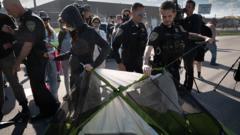


© Alex Kent for The New York Times

© Eric Lee for The New York Times

© Sophie Park for The New York Times

© Michael A. McCoy for The New York Times

© Mike Stewart/Associated Press


© FPG/Archive Photos, via Getty Images

© Sodiq Adelakun/Reuters

© Cesar Olmedo/Reuters










菲律宾防长特奥多罗指中国举行抗日战争胜利80周年阅兵式是在试图重塑世界历史后,中国驻菲律宾大使馆批评,相关言论暴露了特奥多罗的傲慢与无知,并呼吁他走出冷战思维,不要成为中菲关系信任赤字的源头。
综合《马尼拉时报》和GMA报道,特奥多罗(Gilberto Teodoro)星期三(9月3日)受访时,质疑中国当天在北京举行的阅兵是在试图重塑世界历史。
他还形容中国国家主席习近平、俄罗斯总统普京,以及朝鲜最高领导人金正恩同台亮相是对小国的“赤裸裸的恐吓”。
中国驻菲律宾使馆星期六(9月6日)在官网以发言人答记者问的形式回应此事时说,特奥多罗并非首次发表反华言论,“有关言论充分暴露了他的傲慢和无知,不尊重事实,不了解历史”。
80年前,中国人民经过14年浴血奋战,以伤亡3500多万人的巨大代价,彻底打败日本军国主义侵略者,宣告世界反法西斯战争的完全胜利。这是中华民族从近代以来陷入深重危机走向伟大复兴的历史转折点,也是世界发展的一个重大转折点。战后确立的国际秩序,中菲两国既是参与者、建设者,也是受益者。中国隆重纪念中国人民抗日战争暨世界反法西斯战争胜利80周年,目的是铭记历史、缅怀先烈、珍爱和平、开创未来。
二战胜利80年后,和平、发展、合作、共赢的时代潮流没有变,但冷战思维、霸权主义、保护主义阴霾不散,新威胁新挑战有增无减,世界进入新的动荡变革期,全球治理走到新的十字路口。为此,中方在上合组织天津峰会上提出全球治理倡议,并愿同各国一道,推动构建更加公正合理的全球治理体系,携手迈向人类命运共同体。这一倡议顺应了各国人民的普遍愿望,符合当今世界的紧迫需求,一经提出就得到与会各国领导人和国际组织负责人的欢迎和支持,也必将得到国际社会更加积极的响应和更加广泛的认同。全球治理倡议五大核心理念,其精神内涵同联合国宪章宗旨和原则一脉相承,有助于各国依托联合国等多边机制,推动全球治理体系与时俱进进行改革与建设,更加有效应对时代挑战。
本次上合组织天津峰会和抗战胜利纪念活动分别有20多位外国国家元首和政府首脑出席,其中约有10位来自东南亚邻国。与会外国领导人一致高度评价两场盛会,并赞赏中国为维护世界和平、推动多边合作所作出的不懈努力。
我们希望这位菲防长能睁眼看世界,走出冷战思维,不要成为中菲关系信任赤字的源头。

路透社报道,船舶追踪数据显示,又一艘从俄罗斯受制裁项目“北极液化天然气2号”运载液化天然气的油轮停靠中国港口。此前几天,俄罗斯总统普京刚刚在北京会见了中国国家主席习近平。
根据伦敦证交所集团(LSEG)的追踪数据,这艘名为 Voskhod LNG 的俄罗斯籍运输船停泊在中国广西铁山港的一个液化天然气接收站。数据显示,该油轮装载有 15万立方米液化天然气,于7月19日在西伯利亚北部吉丹半岛的“北极 LNG 2” 设施装船。
这是该受制裁项目的第二批运输船运抵中国。此前,受制裁的运输船“北极木兰”号已于 8 月底抵达广西北海 LNG 接收站。这是北极液化天然气项目自去年投产以来的首次发货运抵终端客户。
路透社尚未能确认这批液化天然气是否已在铁山港卸货,拨打港口电话也未能接通。
北极液化天然气项目于投产以来,由于缺乏破冰液化天然气运输船以及因俄乌战争而受到西方制裁,导致供货进度落后于计划。
此次运输抵达中国港,正值普京高调访华,出席上合组织峰会及中国九三阅兵数日。
北极 LNG 2 项目由俄罗斯 诺瓦泰克公司(Novatek,持股 60%) 主导,原计划建成为俄罗斯最大液化天然气工厂之一,目标年产能1980万吨,但制裁已为其前景蒙上阴影。
数据显示,去年该项目共有 8 批液化天然气装船,由多艘受制裁的油轮运输,其中 4 批货物被卸入科里亚克浮式储存装置(FSU)。今年迄今,该项目已装运 6 批 ,部分受制裁油船沿北方海航道向东航行。根据船舶追踪数据,目前两艘油轮停靠在俄罗斯远东的堪察加半岛,另有一艘位于台湾和海南岛之间的南海海域。

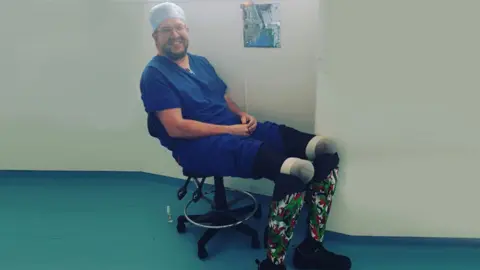 Instagram/Bionicsurgeon
Instagram/BionicsurgeonWhen I interviewed surgeon Neil Hopper in 2023 for BBC News, I believed I was speaking to a man who had been humbled by the life-changing experience of losing his legs to sepsis.
Little did I know, Hopper had a sexual interest in amputation and had frozen his own legs so they would be removed.
Hopper, a consultant vascular surgeon who had carried out hundreds of amputation operations, told me he had come down with a mystery illness on a family camping trip which had led to sepsis and below-knee amputations of both his legs.
In reality, he had used ice and dry ice to freeze his own legs, causing damage that meant they eventually had to be amputated in hospital.
Watching him being jailed on Thursday it was hard to reconcile the reflective man I had interviewed in my capacity as a journalist, with the often graphic details heard in court.
When I interviewed him, I had not doubted the version of events he had told me for one moment. He was a respected surgeon, and why would anyone lie about such a thing?
Warning: Contains information some readers may find upsetting

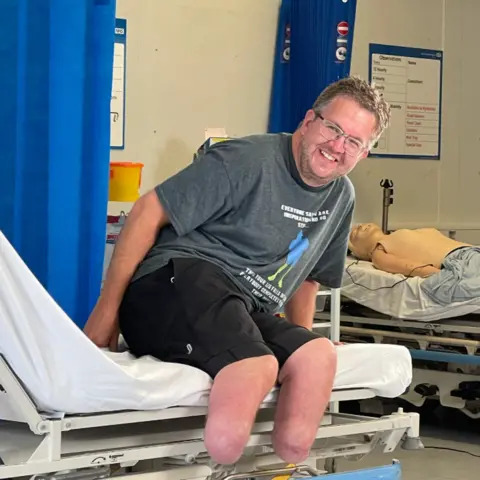 Instagram/Bionicsurgeon
Instagram/BionicsurgeonBack in 2023 Hopper, who grew up in Aberystwyth and Swansea and was living in Truro, Cornwall, appeared almost grateful for the opportunity his life-changing surgery had given him to reassess his life.
"You have to make a lot of sacrifices to be a surgeon and family time is one of them," the father-of-two told me. "I know that was a mistake."
He seemed relaxed, at peace, like a man who had gone through something horrific but had come out the other side changed for the better.
He said losing his legs had led him to "audit" his life and try new things, including applying to become Nasa's first disabled astronaut.
He told me he passed the medical and made it to the final 27 applicants but the space agency eventually selected Paralympic sprinter John McFall.
"My life is more interesting because of what's happened to me," he insisted.
He also praised his wife.
"This didn't happen to me, it happened to us," he said.

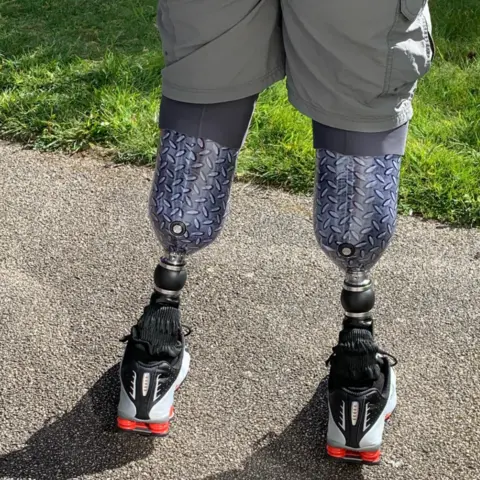 Instagram/Bionicsurgeon
Instagram/BionicsurgeonThe truth behind his amputations was finally laid bare in court on Thursday.
Having his legs amputated was a long-standing ambition for Hopper, the court was told. He had both an obsession and a sexual interest in removing parts of his own body.
The court heard how he had suffered body dysphoria since childhood and his feet were an "unwelcome extra" and a "persisting never-ending discomfort".
For some time, Hopper had been paying to access videos of body mutilation.
The court heard he had bought three videos from the website for £10 and £35, respectively, showing men willingly having their genitals removed.
He also exchanged about 1,500 messages with Marius Gustavson, an amputee who ran the website.
Some of the messages were Hopper seeking advice from Gustavson about how he had brought about his own lower leg amputation.
In one message Hopper told Gustavson: "I've dreamt of this for 20 years."
In another he wrote: "It's going to be awesome being a double amputee."
After his amputations he sent him another message: "It feels so cool. No feet!"

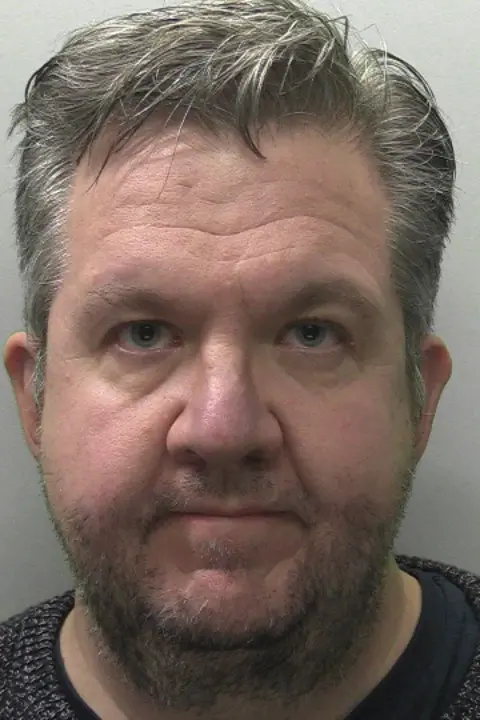 Devon and Cornwall Police
Devon and Cornwall PoliceHopper returned to work for the Royal Cornwall Hospitals NHS Trust just six months after his amputations.
He went on to make fraudulent claims from two insurance firms, lying that the injuries to his legs were the result of sepsis and not self-inflicted.
During this time he messaged a friend to say he felt he should "milk this as much as possible".
The money - totalling more than £466,000 - was quickly spent on luxury items including home improvements, a campervan and a hot tub.
Hopper's unique insight as an amputee who carried out amputation operations, as well as his bid to go into space garnered plenty of media attention.
"He enjoyed the attention that this generated," the court was told.

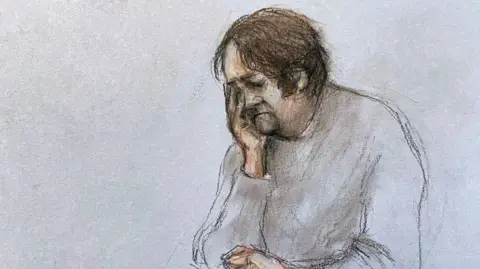 Elizabeth Cook/PA Wire
Elizabeth Cook/PA WireIt was the police investigation into Gustavson that would be Hopper's undoing.
Gustavson was jailed for life in 2024 for leading an extreme body modification ring.
Hopper was arrested in March 2023 and has been suspended from the medical register since December 2023.
On Thursday he was jailed for two years and eight months for insurance fraud and possessing extreme pornography. The court heard Hopper did not regret the operations, but "bitterly regrets" the "dishonesty" about their cause.

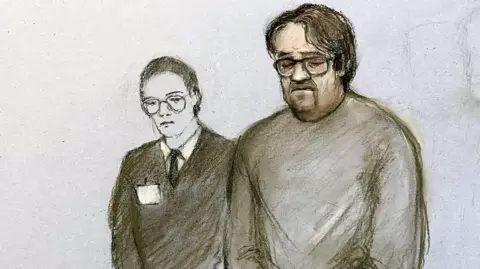 Elizabeth Cook/PA Wire
Elizabeth Cook/PA WireWhen news of the charges against Hopper broke in July, I was shocked.
Then I was confused - what exactly was he accused of doing? And why would someone inflict those injuries on themself?
Then I was concerned. Was I wrong to have taken what he told me at face value?
Fact-checking is an essential part of journalism, but on the face of it this did not appear to be a difficult story to confirm.
I was communicating with Hopper through his place of work, his work as a surgeon was well-documented, and his bilateral amputations were plain to see.
In court Hopper's case was described as "very unique", a "saga" and "difficult to comprehend".
He had managed to pull the wool over the eyes of medics, two insurance companies, and those who knew him - who expressed shock in character references read to the court.
Remembering my conversation with Hopper while watching his sentencing on Thursday, it was clear that as a journalist you never quite know where a story will take you.

 Marianna Massey/Getty Images
Marianna Massey/Getty ImagesLike many Australians, Rach grew up "terrified of the sun" in a country that has the unenviable title of skin cancer capital of the world.
Her childhood was characterised by the infamous "no hat, no play" rule that is commonplace in Australian schools, 90s advertisements that warned the sun would give you cancer, and sunscreen tubes that stood guard at every door in her home.
It made the now 34-year-old the kind of person who religiously applies sunscreen multiple times a day and rarely leaves the house without a hat.
So she was shocked when doctors found a skin cancer on her nose during a check last November, something they said was abnormal given her age and ray-dodging regime.
Though technically classified as a "low grade" skin cancer – a basel cell carcinoma – it had to be surgically removed, leaving the Newcastle mum with a scar just below her eye.
"I was just confused, and I was a little bit angry because I was like, 'Are you kidding me?'" Rach – who asked that her surname not be used – told the BBC. "I thought I'd done all the right stuff and it still happened to me."
That rage grew when she learned the sunscreen she had been using for years was unreliable and, according to some tests, offered next to no sun protection at all.

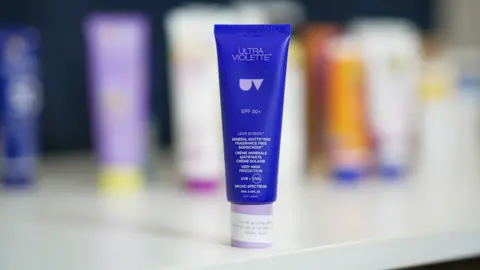 ABC News/Billy Cooper
ABC News/Billy CooperIndependent analysis by a trusted consumer advocacy group has found that several of Australia's most popular, and expensive, sunscreens are not providing the protection they claim to, kicking off a national scandal.
There has been a massive backlash from customers, a probe launched by the country's medical watchdog, multiple products pulled from shelves, and questions raised about the regulation of sunscreen around the globe.
"It's definitely not an issue isolated to Australia," cosmetic chemist Michelle Wong told the BBC.
Australians have a complicated relationship with the sun: they love it, but they also fear it.
Effective public health messaging – which has drilled "Slip, Slop, Slap" into their heads – competes with a beauty culture which often idolises bronzed skin.
The country has the highest incidence of skin cancers in the world and it is estimated that two out of three Australians will have at least one cut out in their lifetime.
So when Choice Australia released its damning report in June, it immediately made waves. The group had tested 20 sunscreens in an independent accredited Australian lab, finding 16 did not meet the SPF, or skin protection factor, rating listed on the packet.
Ultra Violette's Lean Screen SPF 50+ Mattifying Zinc Skinscreen, a facial product that Rach says she used exclusively, was the "most significant failure" identified. It returned a result of SPF 4, something that shocked Choice so much it commissioned a second test that produced a similar reading.
Other products that did not meet their SPF claims included those from Neutrogena, Banana Boat, Bondi Sands and the Cancer Council - but they all rejected Choice's findings and said their own independent testing showed their sunscreens worked as advertised.

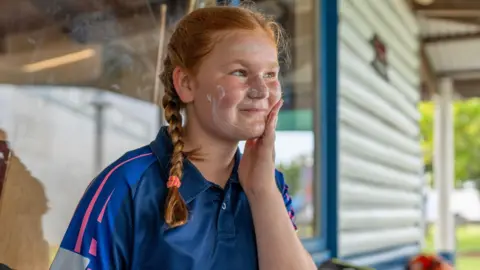 Getty Images
Getty ImagesThe uproar was immediate for the brands named in the report, and also prompted a swift response from the Therapeutic Goods Association (TGA), which said it would investigate the findings and "take regulatory action as required".
Ultra Violette bit back, saying they were "confident that Lean Screen is safe and effective" and detailing extensive testing of the product – which has been sold in almost 30 countries, including the UK, and retails for upwards of A$50 (£24, $33).
But less than two months later, it announced that Lean Screen would be recalled after it returned inconsistent results across eight different sets of lab testing.
"We are deeply sorry that one of our products has fallen short of the standards we pride ourselves on and that you have come to expect of us," read a statement published to the brand's Instagram account.
It added that it has "since ended the relationship with the initial testing lab".
In the past fortnight, other brands have "paused" the sale of at least four more products, none of which were included in the Choice report.
Rach knows there is no way to prove that there is a link between her diagnosis and the brand of sunscreen she relied on. She says she is not alleging there is such a connection.
But she said Ultra Violette's response to the scandal was like "a kick in the guts".
She felt that they took no real accountability for the pitfalls of their product, and was let down by their decision to continue selling it for two months despite doubts over its efficacy.
"I just had like the five stages of grief, you know?" she said. "I was angry, I was upset, I was almost in denial."

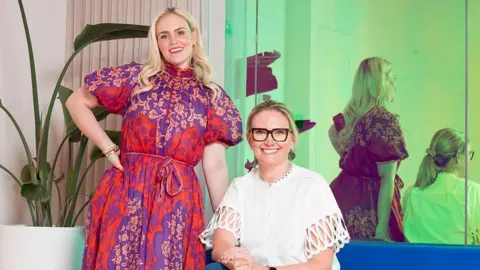 Getty Images
Getty ImagesLike Rach, a horde of annoyed customers say the saga has shaken their faith in the industry.
"A refund isn't really going to reverse years of sun damage, is it?" one wrote in response to Ultra Violette's recall statement.
Choice has urged the TGA to conduct further investigations into the sunscreen market, and also urged any brands who had reason to question the SPF protection listed on their products to remove them from sale immediately.
"It is clear there is a serious issue in the Australian sunscreen industry that urgently needs to be addressed," said Rosie Thomas, the director of campaigns, in a statement to the BBC.
While in Europe sunscreen is classed as a cosmetic, Australia regulates it as a therapeutic good – essentially a medicine – which means it is subject to some of the most robust sunscreen regulations in the world.
And that's something many of the brands caught up in this saga trade on. So, how did this happen?
An investigation by the Australian Broadcasting Corporation found that a single US-based laboratory had certified at least half of the products that had failed Choice's testing, and that this facility routinely recorded high test results.
It also found that several of the sunscreens pulled from shelves shared a similar base formula and linked them to a manufacturer in Western Australia.
The TGA says it does not usually speak about ongoing investigations because it does not want to compromise them, but that it is also looking into "reviewing existing SPF testing requirements" which can be "highly subjective".
"The TGA is also aware that it is common practice for different sunscreen products to share the same or similar base formulations," a spokesperson said in a statement to the BBC.
"Ultimately it is the sponsor's [seller's] responsibility to ensure that their medicine remains compliant with all applicable legislative requirements."
Consistent and comfortable sunscreens which offer high protection are very technical and difficult to make, says Dr Wong, founder of Lab Muffin Beauty Science.
Everyone's skin responds differently to the product, he adds, and it's one that is almost always being stress-tested – by sweat, water, or makeup.
It is very difficult to rate effectively for the same reasons. Historically, it has been done by spreading the sunscreen on 10 people at the same thickness, then timing how long it takes for their skin to start burning both with and without the product applied.

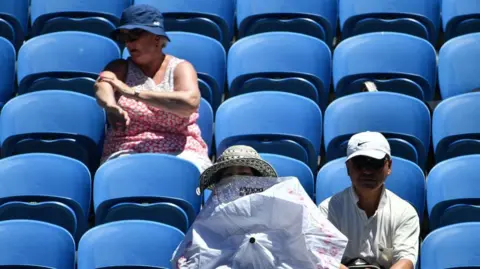 Getty Images
Getty ImagesWhile there are clear guidelines as to what you are looking for, Dr Wong says there is still a lot of variability. That is down to skin texture or tone, or even the colour of the walls, and "different labs get different results".
But she says results are also quite easy to fake, pointing to a 2019 probe by US authorities into a sunscreen testing laboratory which resulted in the owner being jailed for fraud.
Many sunscreen brands from all over the world use the same manufacturers and testing labs - and so this issue is unlikely to be isolated to Australia, she adds.
"Until someone goes out and tests a whole bunch of sunscreens in other countries, we just don't know the extent of it."
She says the scandal is a reminder that regulations are only as good as they are enforced.
But while it has touched a nerve for many people who are at high risk for skin cancer simply by virtue of being Australian, Dr Wong said she felt the panic triggered by the investigation was blown out of proportion.
She points to the world's largest clinical trial of sunscreen, done in the 90s, which found that the daily use of an SPF 16 sunscreen dramatically dropped skin cancer rates.
"95% of the sunscreens tested [by Choice] have high enough SPF to more than half the incidence of skin cancer," Dr Wong said.
"Some of the SPF testing, I feel, has become a bit more of a marketing exercise than a real reflection of efficacy."
The most important thing you can do when choosing a sunscreen, she says, is actually wear enough of it – a full teaspoon at least for each part of your body, face included.
And ideally you should apply it about every two hours, especially if you have been sweating a lot or swimming.
Experts also advise that you combine the sunscreen with other safety methods, such as wearing protective clothing and seeking out shade.
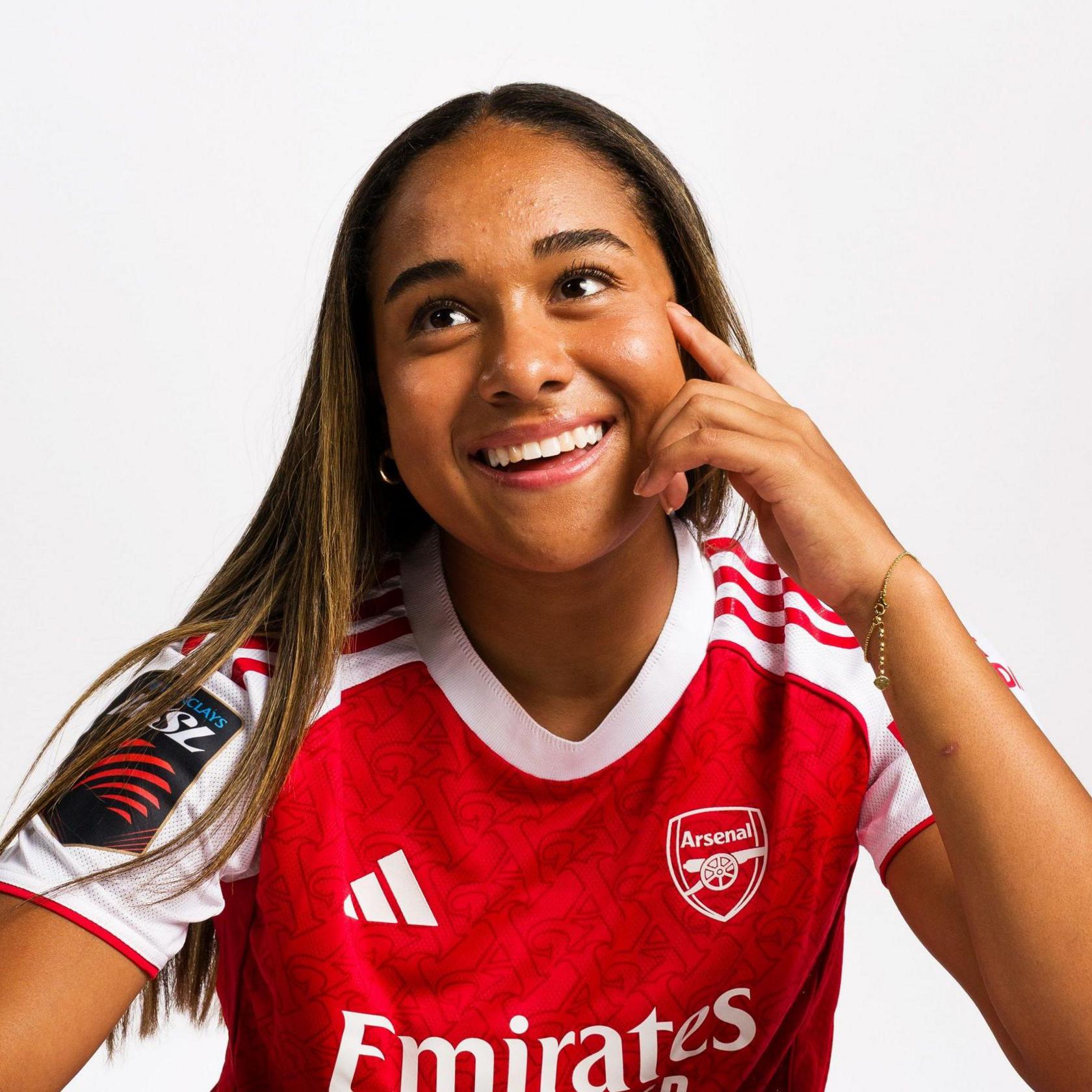
Olivia Smith has already made history.
The 21-year-old has a legacy before she steps out in front of Emirates Stadium's crowd for the first time on Saturday as the first £1m women's footballer.
Arsenal broke the world record to sign her from Liverpool in July and, although it has since been surpassed, she will forever be the women's game's first seven-figure player.
"Everything was leading to this. She was born for this," her former Penn State University head coach Erica Dambach told BBC Sport.
"Yes, it's happened young, but it hasn't happened without years of preparation to get into this environment.
"Sometimes when it happens to young players, it comes on quickly and maybe they've got six months to deal with the emotions and the media training. Liv has been experiencing this stuff since she was 15 years old."
It was at that age she made her debut for Canada - the youngest player to appear for Les Rogues - so the scrutiny and bubbling pressure that will come after signing for the European champions will not be an alien experience for Smith.
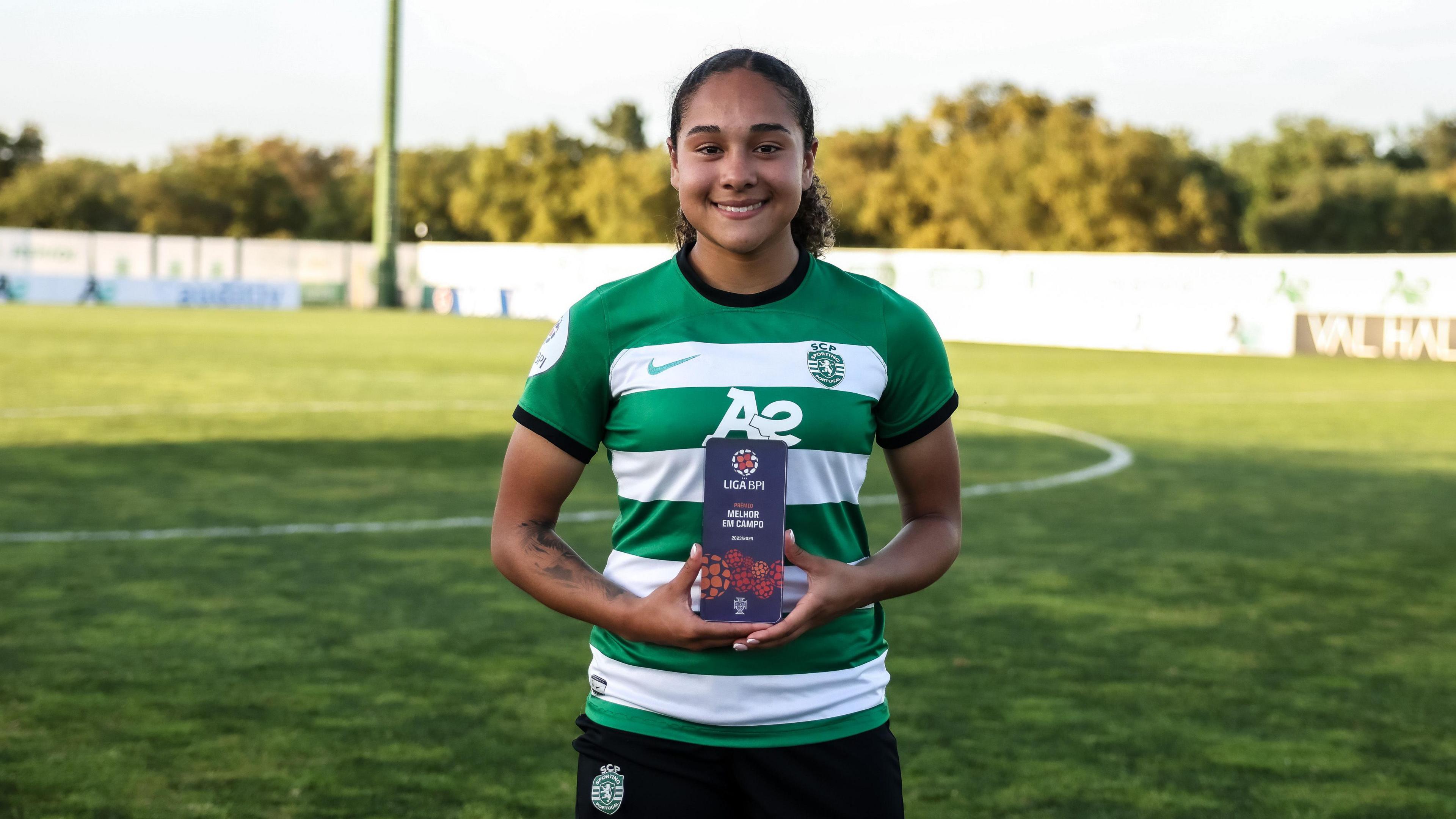
Smith, who only turned professional in 2023, joined Liverpool from Portuguese side Sporting a year ago for a club record fee of just over £200,000
Despite her meteoric rise, her former coaches say she has not changed.
When Liverpool were on the verge of breaking their transfer record - with Smith arriving on Merseyside to complete her medical in a £210,000 deal from Portuguese side Sporting - then-manager Matt Beard met his new prodigious signing in person for the first time over dinner.
"I like to get to know people as people rather than footballers, because I know the footballer that we signed, and we had a lot in common, it was surreal," Beard told BBC Sport.
"She's just a great kid, she's very down to earth. But we just hit it off really well. She's great, and the thing with Olivia is she just takes everything in her stride.
"She's a kid at heart. She's human and I think from my perspective I tried to allow everyone to be themselves and she settled in really quickly. That's just how her personality is."
The relationship that built between player and coach was deep and, even after both departed Liverpool, they stayed in touch. Smith called Beard to thank him after her new club Arsenal's pre-season game against Tottenham Hotspur.
This is a common trait of the Canadian. Smith texted Sporting's head of women's football, Margarida Batlle y Font, after her move to Arsenal and also visited AFC Toronto this summer to meet Marko Milanovic and Billy Wilson, two people who played an instrumental part in her development when they were all at North Toronto Nitros.
"The best thing about Olivia is she's still just Liv," Wilson told BBC Sport. "She's not changed at all. She's still got the exact same group of friends.
"She's just a kid who loves to love life, has a great outlook, loves her football, is always smiling.
"She's not changed a bit and I think that's the biggest testament to who she is. None of this has fazed her."
Her parents have played a vital part in their daughter's impressive rise and have been there to support her along every step.
Sean Smith and Sulee Riquelme-Smith were also at that dinner table in Liverpool - along with the forward, Beard and Russ Fraser, Liverpool's former women's managing director - and that will hardly surprise anyone who has followed the player's career.
"The mum and dad have done an unbelievable job in preparing her for this," said Beard. "They've made a lot of sacrifices as a family.
"They have done a fantastic job raising her and preparing her for this moment as an athlete."
As a child, her passion was always football. Her parents encouraged her to follow her other interests, which have in turned helped her grow as a footballer.
"She played numerous sports such as hockey, and she did a martial arts discipline," said Beard.
"I just think that education alone, if you are looking at martial arts as a sport, it's more about discipline and it's not about the fighting side of it… that's obviously benefited her.
"Smith has - which I never, ever want to take out of players, and you saw it a few times [last season] - a frustration. And I think the top players are like that. So you don't want to take that out."
Batlle y Font also got to experience the big role that Sean played in his daughter's career on the day Smith signed for Sporting, her first move to Europe.
"Her dad is a figure a bit like the father of Venus and Serena Williams," said Sporting's head of women's football.
"He was that kind of mentor to her when she was young and still keeps being on her side. He was very proud of Olivia."

Olivia Smith won the golden boot in her debut campaign with Toronto Nitros
In 2022 Smith was playing at North Toronto Nitros. She ripped League1 Ontario up.
By the time the semi-professional league came to an end, she had scored 18 goals in 11 games and it would be the last time playing club football in her home country.
That summer she moved south of the border, to Penn State University in Pennsylvania. Again, her time there was fleeting.
Despite arriving at Penn State with a serious cruciate ligament injury, sustained at the Under-20 World Cup, and a frail run of form, the calls from Europe arrived by the end of her freshman year.
"It was neat to watch her be able to be an 18-year-old because I don't think there's been a lot of times where she's been able to be her actual age," said former Penn State University head coach Dambach.
"Since leaving Penn State she has put herself out there and put herself in uncomfortable situations and I think through those she was able to really grow and develop."
And so, one year on from that season in Canada, she had left college and moved to Portugal to join Sporting, despite heavy interest in France and England.
Batlle y Font was instrumental in persuading Smith to move to the relatively obscure Portuguese league - and reaped the rewards.
"I won't say that our project is better than those clubs, obviously it's different," said the 30-year-old. "I think she understood that we really wanted her.
"I think that she chose us because she understood that she would have the same rights and same duties as other players, but she would not be one more player.
"Once she made the decision, we never felt that she was looking at us as a minor club, compared to the other clubs interested in her."
It did not take her long to make an impression in Portugal.
"She was 18 and she was playing against experienced players and she would make a bit of a fool of them.
"When she played we would look at each other and say, 'how did we fool this girl to be here? How lucky are we?'"
Again by the end of another fruitful season, she was packing her bags and Batlle y Font was receiving enquiries from multiple clubs in Europe.
"There were more clubs interested and, to be honest, with better offers than Liverpool, but not the kind of project that Olivia wanted," said Batlle Y Font. "Once again, this shows how very grounded Olivia is."
Her debut season in the WSL saw her score seven goals in 20 games for Liverpool, as well as being named the PFA young player of the year. When she arrived at Arsenal this summer, it was her third club in three years.
"I definitely think it's not comfortable, but you have to be comfortable being uncomfortable," said Smith, speaking to reporters in pre-season. "And it's been quite tough for me personally, not knowing what's going to come next.
"Like my first season, I never expected to leave after one season, especially last season, only having one season in what I think is the best league in the world and then coming here.
"So it's certainly not easy, especially with my family so far away, but it does make transitions easier."
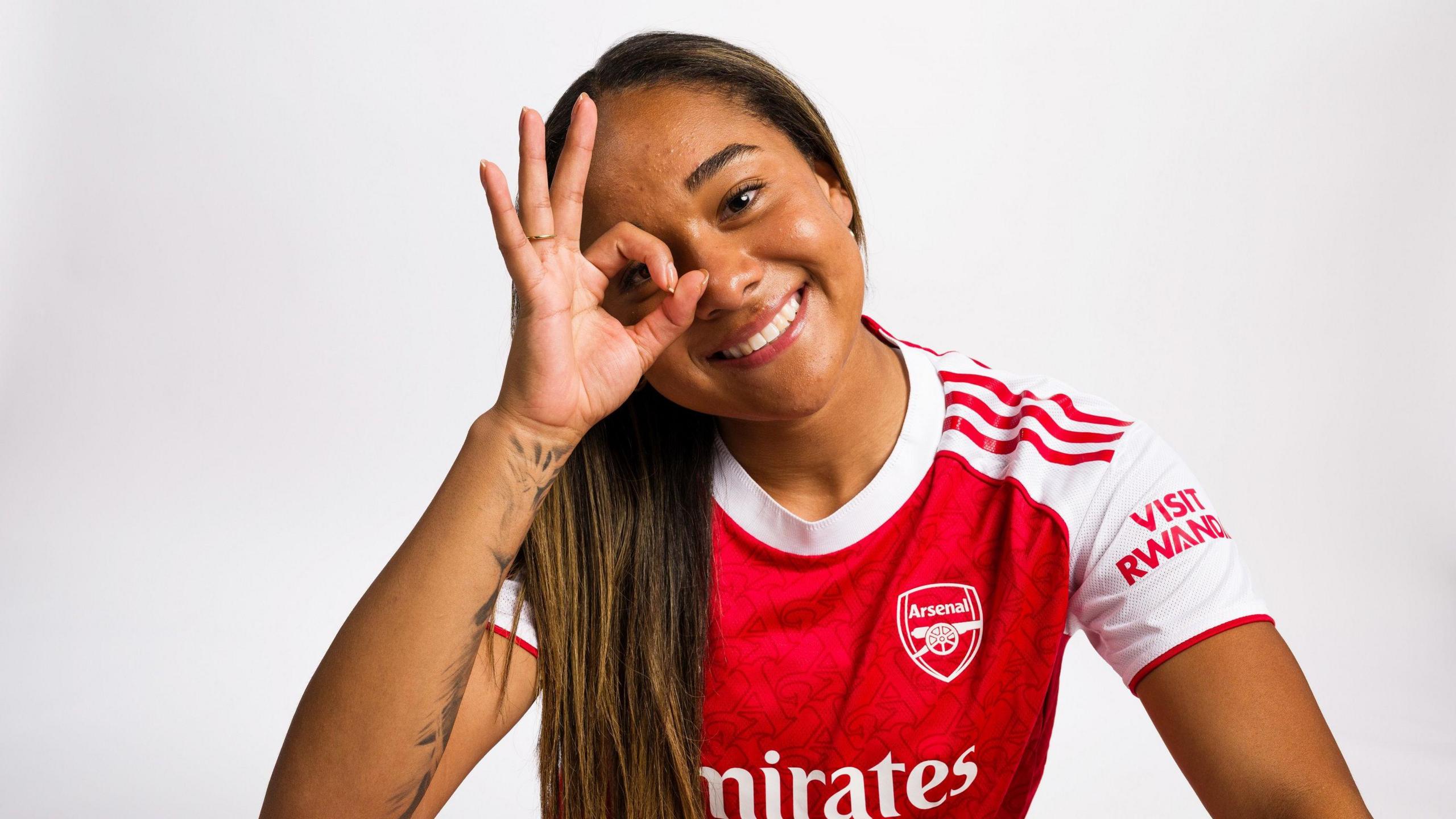
Olivia Smith's world record fee has since been eclipsed by Lizbeth Ovalle, who joined Orlando Pride from Tigres for £1.1m
This summer has shown the rapid growth of the women's game. Smith's world record transfer lasted 35 days, with Orlando Pride signing Lizbeth Ovalle for £1.1m from Tigres.
But Smith will always be the player who was the first to breach the seven-figure mark, like Trevor Francis in the men's game in 1979, and that comes with its own, unique pressure.
"It's definitely an honour, especially coming from Liverpool," said Arsenal's new forward.
"To come with, obviously, such a hefty price tag for such a young player like me, I think they see the potential that I have, and they see my mindset.
"I'm hungry, I'm driven, I want to learn, I want to grow, and I want to win things, ultimately.
"And I think that was a big piece. But with the money, it's not really a big deal for me."
For those who have worked with her, they believe this money will be justified with her performances on the pitch and that she will use the price tag as motivation.
"She just had everything at that age," said Beard. "For me, she's going to be the best player in the world without a shadow of a doubt."
Wilson added: "It's an amazing mentality and some players when they get there, they stay on that limit. She is always trying to overcome limits. It's hard to be consistent and she is consistent."
And for Arsenal, they should have the luxury that Penn State, Sporting and Liverpool were not able to have - more than a year with Smith in their side.
"We knew that she would be [at Sporting] a short time and now Arsenal know that they can have her for quite a while because she's reached the top of European football," said Batlle y Font.
"I have no doubt that even though she's just got to the Champions League winners, she will keep pushing.
"She's very humble, she's quiet and she's a sweet girl. On the pitch, she's a lion."
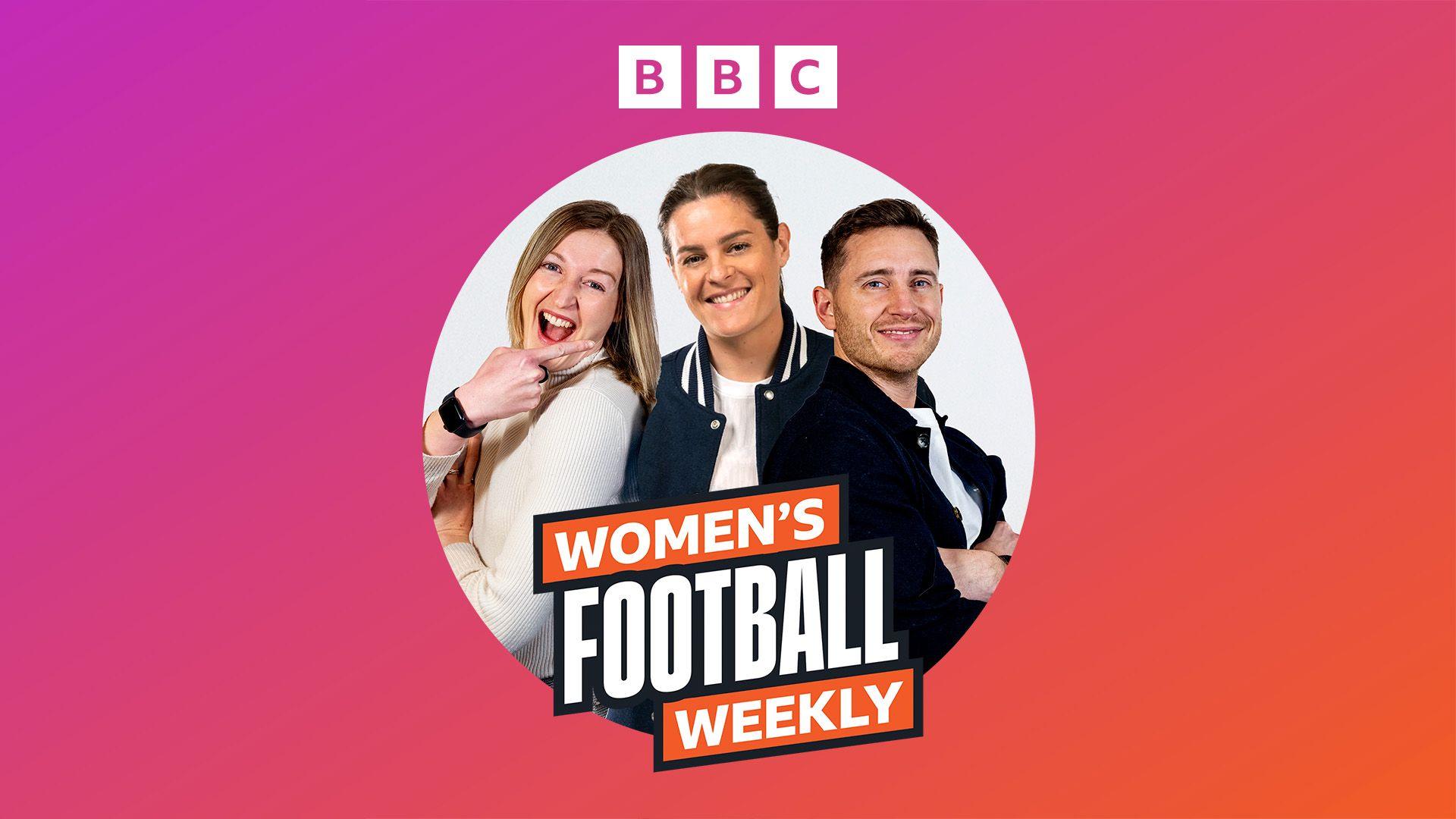
Ben Haines, Ellen White and Jen Beattie are back for another season of the Women's Football Weekly podcast. New episodes drop every Tuesday on BBC Sounds, plus find interviews and extra content from the Women's Super League and beyond on the Women's Football Weekly feed

 NATALIA KOLESNIKOVA/AFP via Getty Images
NATALIA KOLESNIKOVA/AFP via Getty ImagesMarina, a 45-year-old freelance copywriter, has relied on WhatsApp for her work and personal life for years.
But one day last month that abruptly changed when a call to a colleague did not go through properly. They tried Telegram - another messaging app popular in Russia - but that did not work either.
She was one of millions of Russians facing new restrictions imposed in mid-August by Russia's media regulator, Roskomnadzor, on calls made through the two platforms - the country's most popular apps.
The timing coincides with the rollout of a new "national messenger" app known as Max and created by a Russian firm closely controlled by the Kremlin.
Monthly user numbers of WhatsApp and Telegram are estimated to be 97 and 90 million respectively — in a country of 143 million people.
From parents' chats to tenants' groups, much of daily life runs through them. WhatsApp - whose owner, Meta, is designated an extremist organisation in Russia - is especially popular with older people because of how easy it is to register and use.

 AFP via Getty Images
AFP via Getty ImagesIn some parts of Russia, particularly in remote and sparsely connected places in the Far East, WhatsApp is much more than chatting with friends and colleagues. Mobile browsing is sometimes painfully slow, so people use the app to coordinate local matters, order taxis, buy alcohol, and share news.
Both apps offer end-to-end encryption which means that no third party, not even those who own them, are able to read messages or listen to calls.
Officials say the apps refused to store Russian users' data in the country, as required by law, and they have claimed scammers exploit messaging apps. Yet Central Bank figures show most scams still happen over regular mobile networks.
Telecom experts and many Russians see the crackdown as the government trying to keep an eye on who people talk to and potentially what they say.
"The authorities don't want us, ordinary people, to maintain any kind of relationships, connections, friendships or mutual support. They want everyone to sit quietly in their own corner," says Marina who lives in Tula, a city 180km (110 miles) south of Moscow.
She asked us to change her name, worrying that speaking to foreign media can be dangerous.
The new Max app is being aggressively promoted by pop stars and bloggers, and since 1 September all devices sold in Russia must have Max pre-installed.
It was launched by VK, which owns the country's largest social network of the same name. The Facebook-like platform is controlled by oil-and-gas giant Gazprom and one of Vladimir Putin's closest confidantes, billionaire Yuri Kovalchuk.
Max is set to become a super-app, bringing together multiple functions, including government digital services and banking.
The model mirrors China's WeChat - central to daily life but also a tool of censorship and surveillance.
Max's privacy policy states it can pass information to third parties and government bodies, potentially giving access to the security services or making user data vulnerable to leaks.
In Russia, where people are prosecuted for critical comments or private messages, and a black market of personal data feeds an epidemic of scam calls, this is a real concern.
Although many Russians are worried about the new restrictions on WhatsApp and Telegram, and by the introduction of Max, the state already has vast means to spy on its citizens.

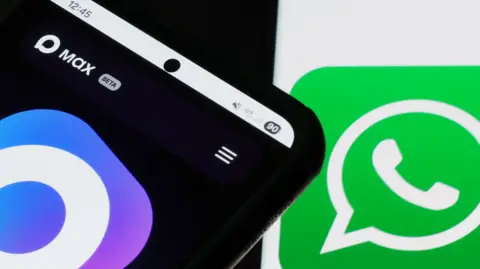 Getty Images
Getty ImagesBy law, you can only buy a sim card with your national ID, and the security services have access to telecom operators' infrastructure. This means they can find out who you call as well as your whereabouts.
From this month it is now illegal to share your sim card with anyone other than a close relative.
But Max can potentially allow the authorities to read your messages as well - and avoiding the app is getting harder.

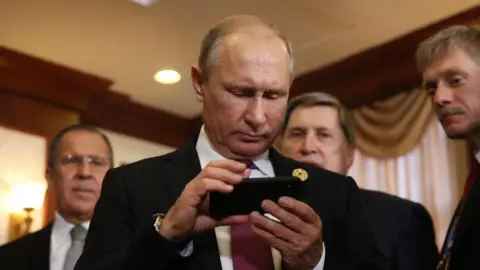 Mikhail Svetlov/Getty Images
Mikhail Svetlov/Getty ImagesSchools are now obliged to move parent chats to the app.
In Rostov region, which borders Ukraine, Max is being adopted as an alert system; in St Petersburg, it is being tied to emergency services.
Despite the push, Max remains far behind its rivals - this week it claimed to have 30 million users.
The Kremlin has long been uneasy of the freedoms offered to people by the internet, which Vladimir Putin once called a CIA project.
The first legislative restrictions came in 2012, soon after mass opposition protests, officially to protect children from suicide-related content.
Ten years later, when Russia launched its full-scale invasion of Ukraine, the government blocked popular social media sites, such as Facebook, Instagram and X, and most independent media, leaving them accessible only through VPNs.
New restrictions keep coming: as of this month, Russians face fines for "deliberately searching" online for extremist materials - more than 5,000 resources from an ever-growing blacklist compiled by the ministry of justice. Examples include a book by opposition leader Alexei Navalny, who died in prison in 2024, and Ukrainian songs.
Another ban targets adverts on platforms linked to "extremist" organisations, in effect ending advertising on Instagram which many small businesses had relied on as a shopfront.
Ads for VPNs are also banned, and while using these apps is not illegal, it may now be treated as an aggravating factor in criminal cases.
Apart from their problems with WhatsApp and Telegram, many Russians are now getting used to life without mobile internet altogether, as entire cities face regular cut-offs.
Since May, every Russian region has seen mobile internet go down.
Blackouts surged through the summer, with up to 77 regions hit by shutdowns simultaneously at the peak, according to the Na Svyazi (In Touch) project.
The authorities justify the measures by the need to protect people and infrastructure from attacks by Ukrainian drones - Kyiv's response to Russia's relentless and deadly bombardments of Ukrainian cities.
But some experts doubt that switching off mobile internet - which many Russians use instead of broadband - is an effective tool against long-distance drone attacks.
Local authorities, who were made responsible for countering drone attacks, have no other means to do it, explains telecom expert Mikhail Klimarev.
"There are no air defence systems, no army - everything's on the frontline," he says. "Their logic goes: we've switched off the internet and there were no drones, hence it works."
In Vladimir, 200km (125 miles) east of Moscow, two of the city's three districts have been offline for almost a month.
"It's impossible to check bus routes or timetables," says Konstantin, a resident who also asked to change his name. "The information boards at stops also show errors."
Taxi fares have risen as drivers cannot accept orders online.
State TV in Vladimir spun the shutdown as "digital detox", showing residents who said they now enjoyed more walking, reading and spending time with friends.
In Krasnoyarsk, a city of more than a million people in Siberia, mobile internet vanished citywide for three days in July and still works poorly.
Some officials rejected complaints, with one Krasnoyarsk bureaucrat suggesting remote workers who lost income should "go and work for the special military operation", as the war in Ukraine is known in Russia. She later apologised.
The government is now working on a scheme that will allow Russians to access only vital online services during shutdowns, such as banking, taxis, deliveries - and the Max messenger.
This is a dangerous step, warns Sarkis Darbinyan, lawyer and co-founder of digital rights group RKS Global.
"There's a possibility the authorities will use this measure for other goals apart from fighting drones," he tells the BBC.
He believes the Kremlin's current approach to the internet mirrors Beijing's.
"Unlike the Chinese, Russians have spent decades enjoying cheap, fast internet and foreign platforms," he says. "These services became deeply ingrained not only in people's daily lives but also in business processes."
For now those who are wary of installing Max on their devices can still find a way around it.
Marina from Tula says her mother, a school teacher, was instructed to download the messenger but claimed to her superiors that she didn't have a smartphone.
People can still call each other using regular mobile networks, although that is more expensive, especially when talking to someone abroad - and not secure.
There are other means available too, like using VPNs or alternative messaging apps, previously reserved for tech nerds and those handling sensitive information.
But as government control over the internet increases, fewer and fewer people will find ways to escape it - and that is assuming the internet is still available for them to try.
Additional reporting by Yaroslava Kiryukhina

 London Fire Brigade
London Fire BrigadeAbout 100 firefighters are tackling a blaze at the BBC's former headquarters, Television Centre, in west London.
London Fire Brigade said 15 engines were at the nine-storey building on Wood Lane, White City, after a fire broke out in the early hours of Saturday morning.
The building is now home to a restaurant and flats, as well as television studios. Authorities said an unspecified number of homes were affected and people had been evacuated.
It is not known what caused the fire or whether there have been any injuries.
London Fire Brigade said it was called out 03:08 BST, with crews drafted in from Hammersmith, North Kensington, Kensington and Chiswick.
Two large turntable ladders were being used to tackle the fire from a height.
"The Brigade is working alongside multi-agency partners, including the Metropolitan Police, to evacuate buildings in the area as a precaution," it said in a statement.
"A rest centre is being set up for residents who have been evacuated from their homes.
"Wood Lane is currently closed to traffic and people are advised to avoid the area as the incident will remain ongoing for some time."
香港政务司长陈国基说,过去几十年香港禁毒工作显著见效,吸毒人数较70年代末减少逾七成,并呼吁继续努力实现“无毒城市”的目标。
据港府新闻公报,陈国基星期五(9月5日)在粤港澳大湾区禁毒高峰会上致辞说,一直以来,港府都以多管齐下的策略应对毒品问题,不仅从源头堵截、强化执法和加强宣传教育入手,全面打击毒品危害,也为吸毒人士提供戒毒治疗与康复服务,协助他们重返社会、重拾健康人生。
他提到,过去几十年,香港禁毒工作取得明显成效,被呈报的吸毒人数较70年代末大幅减少逾七成,但绝不能松懈,要继续努力实现“无毒城市”的目标。
陈国基指出,毒品问题不断演变,必须与时并进。以近期在中国大陆、港澳及东南亚备受关注的新型毒品依托咪酯为例,港府已迅速修例将其列为毒品,依法严厉打击,并通过宣传教育提升公众警觉,同时加强监测和研究,及时应对新型毒品威胁。
他说,毒品问题是全球挑战,犯罪手法越来越复杂,跨境贩毒层出不穷,禁毒工作需要凝聚多方力量,香港特区政府将继续与中国大陆、澳门及其他地区执法机关保持紧密合作,交流情报并开展联合行动,共同打击毒品流通。